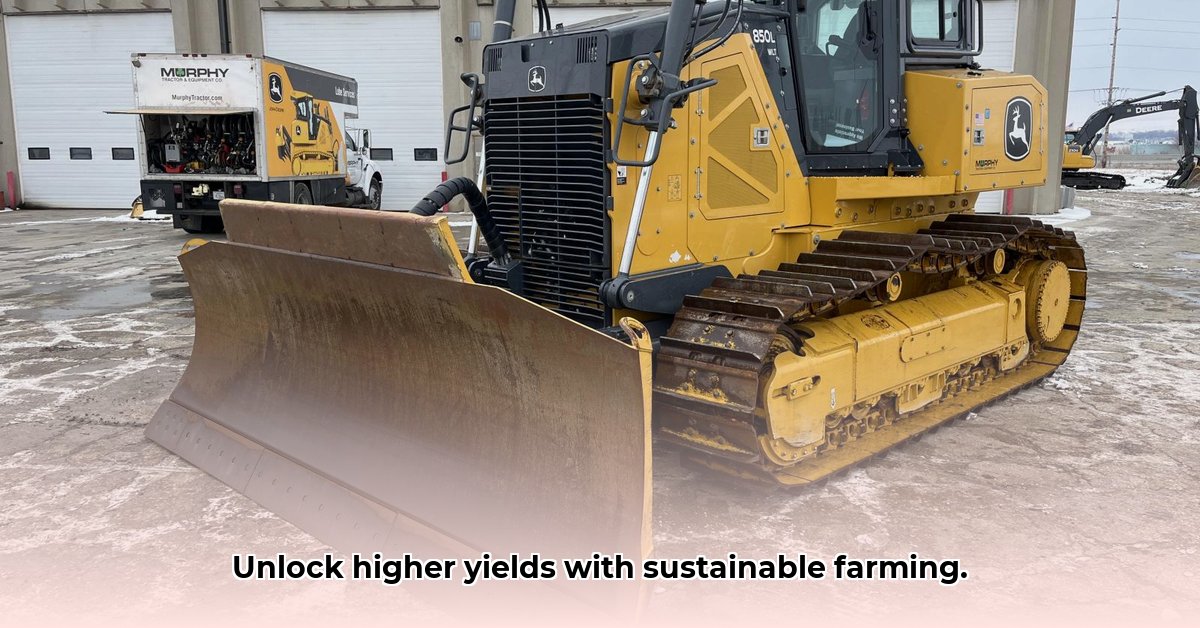
Farming is evolving. It's no longer solely about maximizing yields; environmental stewardship is crucial for long-term profitability. Modern technology, coupled with the expertise of local dealerships like Murphy Tractor in Springfield, Missouri, is empowering farmers to embrace sustainable practices and achieve higher yields while protecting the planet. For more gardening tools, check out this helpful resource.
The Role of Modern Tractors in Sustainable Agriculture
Tractors have transformed from simple machines to precision instruments. Today's models boast improved fuel efficiency, reducing operating costs and minimizing a farmer's carbon footprint. Advanced features minimize soil compaction, promoting healthier soil and improving crop yields. GPS guidance and other technologies enable precise planting and harvesting, reducing waste and maximizing efficiency. This precision farming approach allows for targeted application of inputs, optimizing resource use.
Technology's Impact on Sustainable Farming
Technological advancements are revolutionizing agriculture. GPS-guided machinery enables precise application of fertilizers and pesticides, reducing overuse and environmental impact. Variable-rate technology allows for customized input application based on specific field conditions. Sophisticated software analyzes data to inform better decision-making, from planting schedules to irrigation management. This data-driven approach optimizes resource use and enhances farm efficiency. Isn't it remarkable how technology is enhancing sustainable practices?
Case Studies: Successful Sustainable Farms
Across the country, farmers are successfully integrating sustainable practices – leading to improved yields and reduced environmental impacts. Conservation tillage methods, for example, reduce soil erosion, preserving topsoil and improving water retention. Cover crops enhance soil health, reducing reliance on chemical fertilizers. These innovative approaches demonstrate that sustainability isn't just environmentally responsible; it's also economically viable.
The Economics of Sustainable Farming
While transitioning to sustainable agriculture might involve initial investments, the long-term benefits often outweigh the costs. Reduced input costs (fertilizers, pesticides, water) lead to significant savings. Improved yields and the increasing consumer demand for sustainably-produced food translate into greater profits. Government programs and incentives further support farmers in making this transition. Are the financial rewards of sustainable farming compelling enough to start considering a transition?
Choosing the Right Equipment: Partnering with Murphy Tractor
Selecting the appropriate equipment is pivotal to successful sustainable farming. Local dealerships, like Murphy Tractor Springfield MO, play a vital role in guiding farmers towards the best solutions. They provide expert advice on fuel-efficient tractors, equipment designed to minimize soil compaction, and the integration of new technologies. This partnership ensures a smooth transition to sustainable farming practices.
A Step-by-Step Guide to Sustainable Farming
Embracing sustainable practices can be broken into manageable steps:
- Assess your current practices: Analyze your farming methods to identify areas for improvement in resource use and environmental impact.
- Select appropriate technology: Research and choose equipment and software tailored to your farm's needs and goals.
- Implement gradually: Introduce sustainable practices in phases, adapting and refining your approach based on results.
- Monitor and evaluate: Track key metrics (yield, resource use, environmental impact) to inform adjustments.
- Seek expert guidance: Utilize resources such as agricultural consultants and local dealerships like Murphy Tractor for support.
Sustainable Farming: Weighing the Pros and Cons
Sustainable farming presents both advantages and challenges:
| Feature | Pros | Cons |
|---|---|---|
| Environmental Impact | Reduced greenhouse gas emissions, healthier soil, less water waste | Requires adjustments to existing farming practices. |
| Economic Impact | Lower input costs, greater yields, increased market demand and pricing | Higher initial investment; requires new knowledge and skills. |
| Operational Impact | Improved efficiency, often less labor, less reliance on synthetic inputs | Might require additional training and expertise. |
The transition to sustainable agriculture is not merely a trend; it's a crucial step towards a more environmentally responsible and economically viable future for farmers. With the assistance of advanced technology and knowledgeable partnerships, such as those available through Murphy Tractor Springfield MO, this transition becomes both attainable and rewarding.